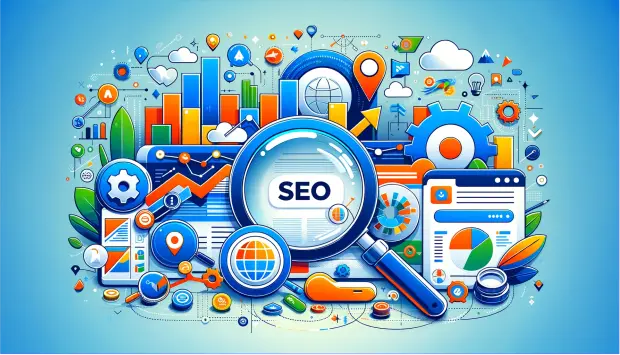A Beginner’s Guide to SEO (Search Engine Optimization)
Welcome to the beginner’s guide to Search Engine Optimization (SEO), a vital tool in the digital marketing world. SEO is the art of making your website more visible on search engines like Google. It’s about understanding what people are searching for online and optimizing your website accordingly.
With good SEO practices, your site can appear higher in search results, attracting more visitors. It’s not just about search engines but also about providing a great experience for your website visitors. This guide will introduce you to the basics of SEO and how you can start using it to your advantage.
Understanding Search Engine Optimization
SEO is a method used to increase a website’s visibility when people search for products, services, or information. It involves various strategies and techniques to enhance the ranking of a website on search engine result pages (SERPs).
Search engines use algorithms to decide which pages to show for a particular search term. SEO practices align your website’s content and design with these algorithms. The goal is to make your site as appealing as possible to both search engines and users. Understanding and implementing Search Engine Optimization can significantly impact your website’s traffic.
The Role of Keywords in Search Engine Optimization
Keywords are phrases or terms that people use to search for information online. They are the cornerstone of SEO strategies. To optimize your website, you need to identify the keywords that are relevant to your business and are frequently used by your target audience.
Once identified, these keywords should be incorporated into your website’s content, titles, and meta descriptions. However, it’s important to use them naturally and avoid ‘keyword stuffing’, as this can negatively impact your search engine optimization. The right balance of keywords helps search engines understand what your website is about and how it should rank.
Content Quality and Search Engine Optimization
Quality content is essential for effective SEO. Your website should provide valuable and relevant information that meets the needs of your audience. Search engines favor content that is informative, well-written, and regularly updated.
Creating blog posts, articles, videos, and infographics are great ways to keep your content fresh and engaging. Additionally, ensuring your content answers common questions related to your field can improve its visibility. Remember, content that appeals to your audience will likely appeal to search engines too.
On-Page SEO Techniques
On-page SEO refers to optimization strategies used directly on your website. It includes optimizing your website’s content, structure, and HTML code. Key elements of on-page SEO include title tags, headings, internal links, and images.
Make sure your website is structured logically, and each page has a clear focus. Use descriptive URLs and ensure each page has a unique and informative title and meta description. These small changes can make a big difference in how search engines understand and rank your website.
Off-Page SEO Strategies
Off-page SEO involves activities outside your website to improve its position in search rankings. The most significant aspect of off-page SEO is building backlinks, which are links from other websites to yours.
Backlinks from high-quality and reputable websites can significantly boost your site’s authority and ranking. Social media marketing, guest blogging, and influencer collaborations are other ways to enhance off-page SEO. Remember, it’s about building your website’s reputation and visibility across the web.
Technical SEO Explained
Technical SEO focuses on the technical aspects of your website that impact its ranking. This includes improving site speed, ensuring your website is mobile-friendly, and having a secure connection (HTTPS).
It’s also about making sure search engines can easily crawl and index your site. Technical SEO might involve tasks like optimizing your site’s XML sitemap and robots.txt file. Although it can get quite technical, addressing these aspects is crucial for a well-optimized website.
In nutshell, SEO is an ongoing process and not a one-time task. It requires continuous effort and adaptation to changing search engine algorithms. Start with the basics, keep learning, and experiment with different strategies to see what works best for your website. Remember, the ultimate goal of SEO is not just to increase rankings but also to improve user experience and website performance. With time and practice, it can become a powerful tool in your digital marketing career.



